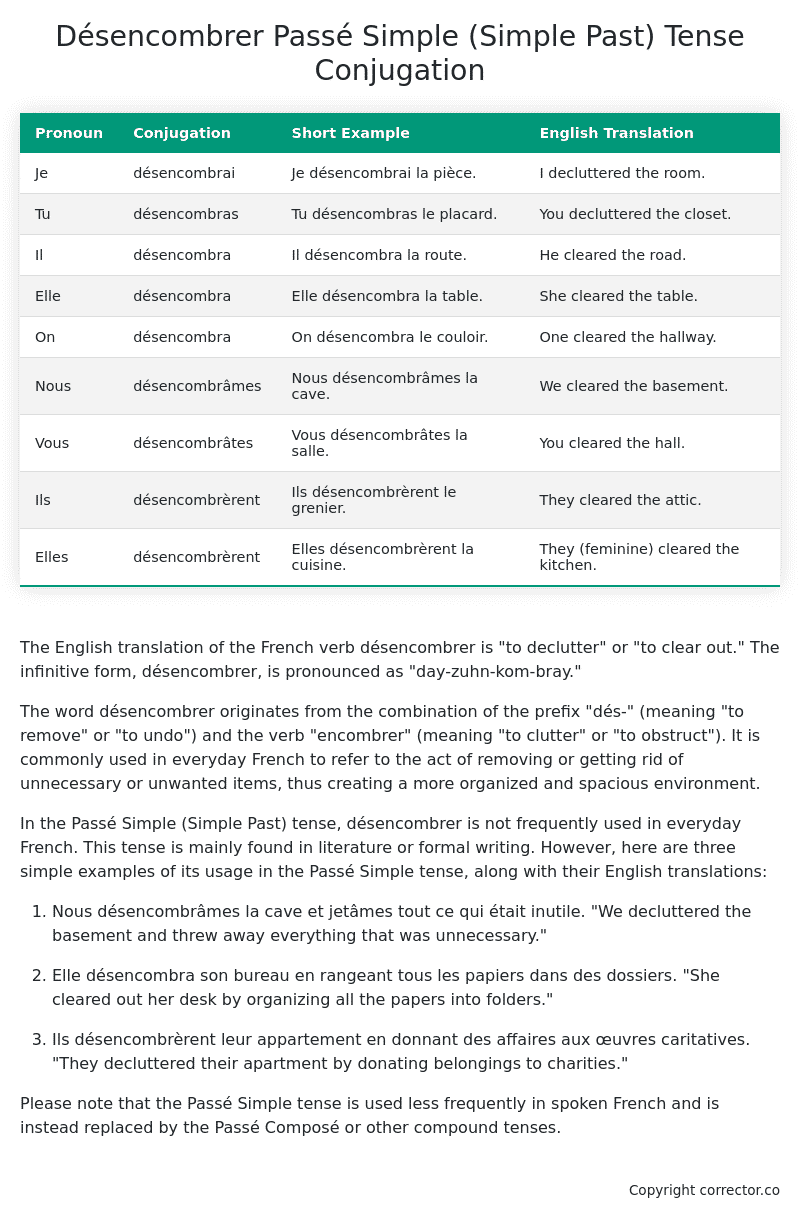Passé Simple (Simple Past) Tense Conjugation of the French Verb désencombrer
Introduction to the verb désencombrer
The English translation of the French verb désencombrer is “to declutter” or “to clear out.” The infinitive form, désencombrer, is pronounced as “day-zuhn-kom-bray.”
The word désencombrer originates from the combination of the prefix “dés-” (meaning “to remove” or “to undo”) and the verb “encombrer” (meaning “to clutter” or “to obstruct”). It is commonly used in everyday French to refer to the act of removing or getting rid of unnecessary or unwanted items, thus creating a more organized and spacious environment.
In the Passé Simple (Simple Past) tense, désencombrer is not frequently used in everyday French. This tense is mainly found in literature or formal writing. However, here are three simple examples of its usage in the Passé Simple tense, along with their English translations:
-
Nous désencombrâmes la cave et jetâmes tout ce qui était inutile.
“We decluttered the basement and threw away everything that was unnecessary.” -
Elle désencombra son bureau en rangeant tous les papiers dans des dossiers.
“She cleared out her desk by organizing all the papers into folders.” -
Ils désencombrèrent leur appartement en donnant des affaires aux œuvres caritatives.
“They decluttered their apartment by donating belongings to charities.”
Please note that the Passé Simple tense is used less frequently in spoken French and is instead replaced by the Passé Composé or other compound tenses.
Table of the Passé Simple (Simple Past) Tense Conjugation of désencombrer
| Pronoun | Conjugation | Short Example | English Translation |
|---|---|---|---|
| Je | désencombrai | Je désencombrai la pièce. | I decluttered the room. |
| Tu | désencombras | Tu désencombras le placard. | You decluttered the closet. |
| Il | désencombra | Il désencombra la route. | He cleared the road. |
| Elle | désencombra | Elle désencombra la table. | She cleared the table. |
| On | désencombra | On désencombra le couloir. | One cleared the hallway. |
| Nous | désencombrâmes | Nous désencombrâmes la cave. | We cleared the basement. |
| Vous | désencombrâtes | Vous désencombrâtes la salle. | You cleared the hall. |
| Ils | désencombrèrent | Ils désencombrèrent le grenier. | They cleared the attic. |
| Elles | désencombrèrent | Elles désencombrèrent la cuisine. | They (feminine) cleared the kitchen. |
Other Conjugations for Désencombrer.
Le Present (Present Tense) Conjugation of the French Verb désencombrer
Imparfait (Imperfect) Tense Conjugation of the French Verb désencombrer
Passé Simple (Simple Past) Tense Conjugation of the French Verb désencombrer (You’re reading it right now!)
Passé Composé (Present Perfect) Tense Conjugation of the French Verb désencombrer
Futur Simple (Simple Future) Tense Conjugation of the French Verb désencombrer
Futur Proche (Near Future) Tense Conjugation of the French Verb désencombrer
Plus-que-parfait (Pluperfect) Tense Conjugation of the French Verb désencombrer
Passé Antérieur (Past Anterior) Tense Conjugation of the French Verb désencombrer
Futur Antérieur (Future Anterior) Tense Conjugation of the French Verb désencombrer
Subjonctif Présent (Subjunctive Present) Tense Conjugation of the French Verb désencombrer
Subjonctif Passé (Subjunctive Past) Tense Conjugation of the French Verb désencombrer
Subjonctif Imparfait (Subjunctive Imperfect) Tense Conjugation of the French Verb désencombrer
Conditionnel Présent (Conditional Present) Tense Conjugation of the French Verb désencombrer
Conditionnel Passé (Conditional Past) Tense Conjugation of the French Verb désencombrer
Conditionnel Passé II (Conditional Past II) Tense Conjugation of the French Verb désencombrer
L’impératif Présent (Imperative Present) Tense Conjugation of the French Verb désencombrer
L’impératif Passé (Imperative Past) Tense Conjugation of the French Verb désencombrer
L’infinitif Présent (Infinitive Present) Tense Conjugation of the French Verb désencombrer
L’infinitif Passé (Infinitive Past) Tense Conjugation of the French Verb désencombrer
Le Participe Présent (Present Participle) Tense Conjugation of the French Verb désencombrer
Le Participe Passé (Past Participle) Tense Conjugation of the French Verb désencombrer
Struggling with French verbs or the language in general? Why not use our free French Grammar Checker – no registration required!
Get a FREE Download Study Sheet of this Conjugation 🔥
Simply right click the image below, click “save image” and get your free reference for the désencombrer Passé Simple tense conjugation!

Désencombrer – About the French Passé Simple (Simple Past) Tense
Formation
Usage
Narration
Historical Context
Interactions with other tenses
Passé Composé
Imparfait
Conditional and Subjunctive
Summary
I hope you enjoyed this article on the verb désencombrer. Still in a learning mood? Check out another TOTALLY random French verb conjugation!


